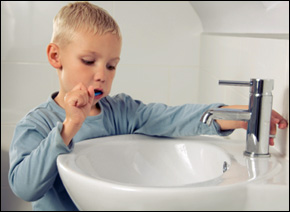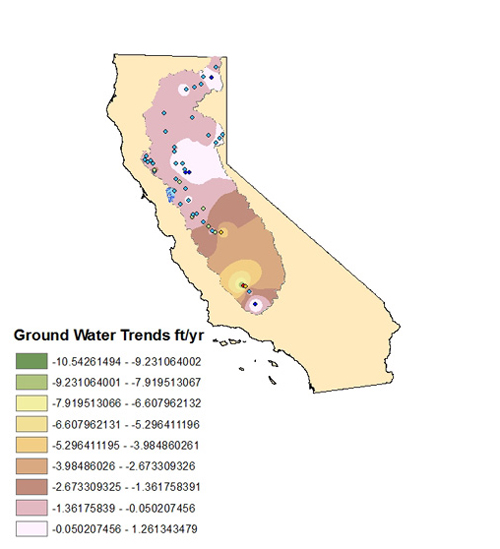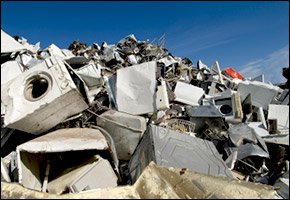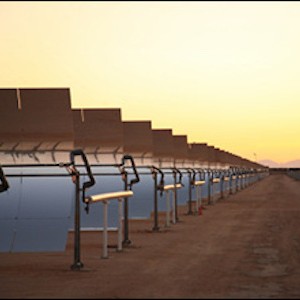Peter Gleick: The Kids Are Right: Turn off the Tap When You Brush Your Teeth
 One of the key solutions to our water problems is to use the water we have more efficiently. Research we’ve done at the Pacific Institute has shown this over and over again in every sector of society. But in all the work we’ve done, we’ve stayed away from recommending that people reduce water use by changing behavior. We’ve never, for example, calculated how much water could be saved by eliminating urban lawns in the western U.S. or cotton in western agriculture, or by taking shorter showers. Rather, we have focused on the water savings of doing the things we do now, only more efficiently.
One of the key solutions to our water problems is to use the water we have more efficiently. Research we’ve done at the Pacific Institute has shown this over and over again in every sector of society. But in all the work we’ve done, we’ve stayed away from recommending that people reduce water use by changing behavior. We’ve never, for example, calculated how much water could be saved by eliminating urban lawns in the western U.S. or cotton in western agriculture, or by taking shorter showers. Rather, we have focused on the water savings of doing the things we do now, only more efficiently.
Why? Not because the water savings from behavioral changes are inconsequential: in fact, eliminating lawns (or cotton or meat in our diets) would produce vast savings. But people don’t like to be “told” what to do. Instead, society is supposed to provide “incentives” in the form of carrots (bribes?) or sticks (threats?) to change behavior.
Fine. But there is also personal responsibility. In the next few months of blog posts, I will begin to offer some information, data, and numbers on the potential water savings of changing behavior, to add to the numbers the Institute has produced on improving efficiency. No carrots; no sticks; just information on the implications of our choices.
Let’s start with an easy one. Kids often ask me if they should turn off the tap while they brush their teeth, rather than letting it run. Given the vast amount of water used to produce things like rice, alfalfa, semiconductor chips, or energy, or used to flush toilets and water golf courses, I always gave this question little thought. How quaint of the kids to want to help, even in little ways…until I crunched the numbers:
Water Number: 600 billion gallons a year nationwide.
Yes, that’s right, more than half a trillion gallons of water a year would be saved if you turned off the tap when you brushed your teeth.
This is based on simple assumptions (you only brush once a day letting the water run for 2 minutes, and then cut that time to 15 seconds if you turn the tap off; and you use a 3-gallon per minute faucet, which is typical) – feel free to modify them, but we’re talking a lot of water no matter what. If we’re all brushing twice a day, like the dentist wants, we’d save twice as much water.
Considering the impact of water usage during daily activities, it’s easy to see how small changes can add up over time. If each person reduces the amount of water used while brushing their teeth, they can conserve a significant amount of water annually. A simple adjustment like turning off the tap while brushing for just a few seconds can save thousands of gallons of water per year. When combined with other water-saving habits, such as using a low-flow faucet or taking shorter showers, the collective effect can be incredibly beneficial for the environment.
Dental professionals also play a role in promoting water conservation. Many recommend turning off the tap while brushing as part of a broader approach to healthy habits. For those looking to take extra care of their oral health while also being mindful of environmental impact, consulting a dentist in henderson nv can provide additional guidance on water-saving techniques that are both practical and beneficial. They can offer personalized advice tailored to your routine, helping you save resources without compromising your dental care.
These savings are real: This is water you won’t have to pay for, the water utility won’t have to collect, treat, and pump to you, and the wastewater utility won’t have to collect, treat, and dispose of.
Turns out the kids are right.
Peter Gleick
Dr. Gleick’s blog posts are provided in cooperation with the SFGate. Previous posts can be found here.
See Also: Ten Things you Should Know about Water









Leave a Reply
Want to join the discussion?Feel free to contribute!